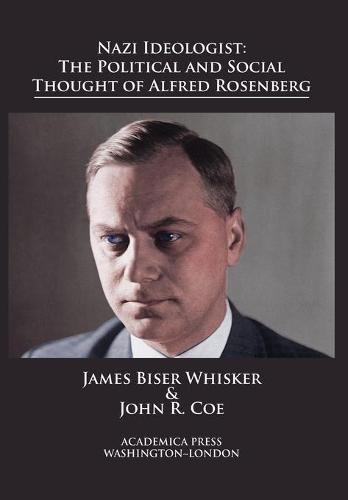Readings Newsletter
Become a Readings Member to make your shopping experience even easier.
Sign in or sign up for free!
You’re not far away from qualifying for FREE standard shipping within Australia
You’ve qualified for FREE standard shipping within Australia
The cart is loading…






This title is printed to order. This book may have been self-published. If so, we cannot guarantee the quality of the content. In the main most books will have gone through the editing process however some may not. We therefore suggest that you be aware of this before ordering this book. If in doubt check either the author or publisher’s details as we are unable to accept any returns unless they are faulty. Please contact us if you have any questions.
This book by dynamic scholars James Whisker and John Coe examines the short life of the Nazi ideologist Alfred Rosenberg, one of the most overlooked individuals in the pantheon of leaders in the Third Reich. Born to German mercantile parents in the Baltic region of the Russian Empire, he was a student in Russia during the Bolshevik Revolution. Deeply influenced by the anti-Semitic forgery The Protocols of the Elders of Zion, a propaganda pamphlet distributed by the tsar’s secret police, he carried it to Germany, where he introduced it to Adolf Hitler.
Rosenberg leaned heavily on heterodox Christian writings that challenged mainstream Christian thought. He revived interest in a variety of philosophies and individuals long forgotten, such as the cosmic dualistic Cathars and the mystic Master Eckart von Hochheim. Rosenberg came to view history from a perspective often called Scientific Racism, which held that the history of humankind had been marked by a struggle between the Aryan race and their supposed inferiors. Race was the newest subject for the application of cosmic dualism, which is the spiritual belief that two fundamental concepts exist. Rosenberg identified the Nazis’ task as creating a bulwark against Semitic influences from Europe generally and Germany in particular, and to do so by any means necessary.
Rosenberg figured in a long anti-Jewish tradition in Germany, a tortured legacy that began with Martin Luther and continued through many of the prominent German figures of the nineteenth century. Indeed, Rosenberg considered his magnum opus, The Myth of the 20th Century, to be the logical successor work to Foundations of the 19th Century by the composer Richard Wagner’s son-in-law Houston Stewart Chamberlain.
$9.00 standard shipping within Australia
FREE standard shipping within Australia for orders over $100.00
Express & International shipping calculated at checkout
This title is printed to order. This book may have been self-published. If so, we cannot guarantee the quality of the content. In the main most books will have gone through the editing process however some may not. We therefore suggest that you be aware of this before ordering this book. If in doubt check either the author or publisher’s details as we are unable to accept any returns unless they are faulty. Please contact us if you have any questions.
This book by dynamic scholars James Whisker and John Coe examines the short life of the Nazi ideologist Alfred Rosenberg, one of the most overlooked individuals in the pantheon of leaders in the Third Reich. Born to German mercantile parents in the Baltic region of the Russian Empire, he was a student in Russia during the Bolshevik Revolution. Deeply influenced by the anti-Semitic forgery The Protocols of the Elders of Zion, a propaganda pamphlet distributed by the tsar’s secret police, he carried it to Germany, where he introduced it to Adolf Hitler.
Rosenberg leaned heavily on heterodox Christian writings that challenged mainstream Christian thought. He revived interest in a variety of philosophies and individuals long forgotten, such as the cosmic dualistic Cathars and the mystic Master Eckart von Hochheim. Rosenberg came to view history from a perspective often called Scientific Racism, which held that the history of humankind had been marked by a struggle between the Aryan race and their supposed inferiors. Race was the newest subject for the application of cosmic dualism, which is the spiritual belief that two fundamental concepts exist. Rosenberg identified the Nazis’ task as creating a bulwark against Semitic influences from Europe generally and Germany in particular, and to do so by any means necessary.
Rosenberg figured in a long anti-Jewish tradition in Germany, a tortured legacy that began with Martin Luther and continued through many of the prominent German figures of the nineteenth century. Indeed, Rosenberg considered his magnum opus, The Myth of the 20th Century, to be the logical successor work to Foundations of the 19th Century by the composer Richard Wagner’s son-in-law Houston Stewart Chamberlain.